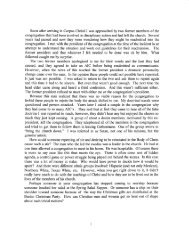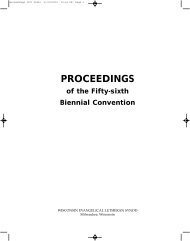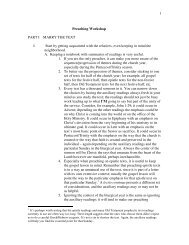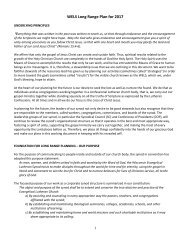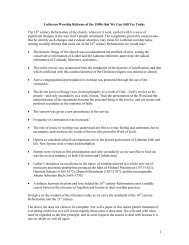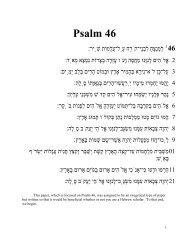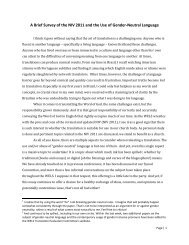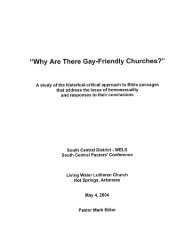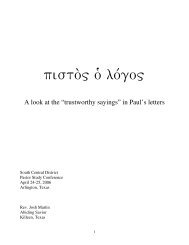A History of the WELS - The South Central District
A History of the WELS - The South Central District
A History of the WELS - The South Central District
Create successful ePaper yourself
Turn your PDF publications into a flip-book with our unique Google optimized e-Paper software.
7<br />
3. To rouse interest in <strong>the</strong> congregations for this undertaking, so necessary to <strong>the</strong> prospering <strong>of</strong><br />
Synod and <strong>the</strong>rewith <strong>of</strong> <strong>the</strong> kingdom <strong>of</strong> God, <strong>the</strong> present pastors and delegates are to submit<br />
<strong>the</strong> matter as soon as possible to <strong>the</strong>ir congregations for deliberation and disposition.<br />
4. An agitation committee 13 ought to be appointed by Synod which as <strong>the</strong> next thing on <strong>the</strong><br />
program should draft a circular to <strong>the</strong> congregations in which this matter is commended to<br />
<strong>the</strong>m. This circular ought to be handed to <strong>the</strong> delegates and pastors to take along before <strong>the</strong><br />
close <strong>of</strong> synod.<br />
5. Each congregation ought to report to this agitation committee, which is to be appointed, in<br />
which way it proposes to raise its contributions for <strong>the</strong> above purposes.<br />
6. <strong>The</strong> agitation committee ought to be authorized to send a special collector to congregations<br />
that so wish.<br />
7. It shall fur<strong>the</strong>r be incumbent on this committee to urge tardy congregations in a suitable<br />
manner to discharge <strong>the</strong>ir obligation <strong>of</strong> love concerning <strong>the</strong> above purpose.<br />
8. <strong>The</strong> committee, fur<strong>the</strong>rmore, begs leave to point out to <strong>the</strong> venerable synod that in <strong>the</strong> future<br />
no new appropriations <strong>of</strong> any size ought to be made before <strong>the</strong> congregations have been<br />
informed <strong>the</strong>re<strong>of</strong> by three notices in <strong>the</strong> Gemeindeblatt, so <strong>the</strong>y can instruct <strong>the</strong>ir delegates.<br />
14<br />
<strong>The</strong> agitation committee appointed consisted <strong>of</strong> Pastors H. Knuth and H. Bergmann, and laymen O. Griebling<br />
and Graebner. Synod’s debt at this time amounted to $15,586.24.<br />
<strong>The</strong> Wisconsin Synod Enters <strong>the</strong> Twentieth Century: 1900-1929<br />
<strong>The</strong> Wisconsin Synod entered <strong>the</strong> twentieth century with a very organized plan for a synod-wide<br />
collection to liquidate its entire debt <strong>of</strong> $15,586.24. When <strong>the</strong> agitation committee reported to Synod in 1900, <strong>the</strong><br />
amount raised was $18,600.<br />
<strong>The</strong> committee’s report…told <strong>of</strong> 175 congregations; 105 house collections, for <strong>the</strong> most part not<br />
yet finished; 15 congregations would begin after synod; from 11 congregations, four <strong>of</strong> <strong>the</strong>m<br />
very poor, no house collection could be expected; 15 congregations could not collect on<br />
account <strong>of</strong> extra disbursements <strong>of</strong> <strong>the</strong>ir own but would do so <strong>the</strong> following year; 29<br />
congregations had not answered. <strong>The</strong> committee would see to it that every congregation in<br />
Synod would be enlisted in <strong>the</strong> liquidation <strong>of</strong> <strong>the</strong> debt, and it did not consider its assignment<br />
accomplished until it did. 15<br />
Synod resolved that <strong>the</strong> committee be retained, and in 1901 its report read:<br />
In 25 congregations <strong>the</strong> house collection has not yet been finished; 34 congregations have not<br />
collected as yet but are willing to contribute at <strong>the</strong> proper time to <strong>the</strong> best <strong>of</strong> <strong>the</strong>ir ability; <strong>the</strong><br />
committee wants to continue its efforts by admonishing pastors and congregations which are in<br />
default and by sending collectors. 16<br />
Again Synod went along with <strong>the</strong> committee’s recommendations, and in 1902 its report read:<br />
A few more congregations have sent in a house collection, 39 a Sunday <strong>of</strong>fering; 19<br />
congregations haven’t done anything; <strong>the</strong> praeses or some o<strong>the</strong>r <strong>of</strong>ficial. should be assigned to<br />
admonish <strong>the</strong> delinquent congregations, kindly but at <strong>the</strong> same time firmly. 17<br />
After this report in 1902 Synod urged <strong>the</strong> committee to wind up its business that year. <strong>The</strong> committee<br />
met in a private session and decided on this recommendation to Synod:<br />
13 Koehler says, “<strong>The</strong> ‘agitation’ was harmless enough, but it is significant that it was <strong>the</strong> beginning <strong>of</strong> <strong>the</strong> period<br />
when agitation in <strong>the</strong> evil sense, and <strong>the</strong> German term ‘agitieren’ to denote it, became current in Synod.”<br />
14 Koehler, pp. 229-230.<br />
15 Ibid., p.230.<br />
16 Ibid.<br />
17 Ibid.



